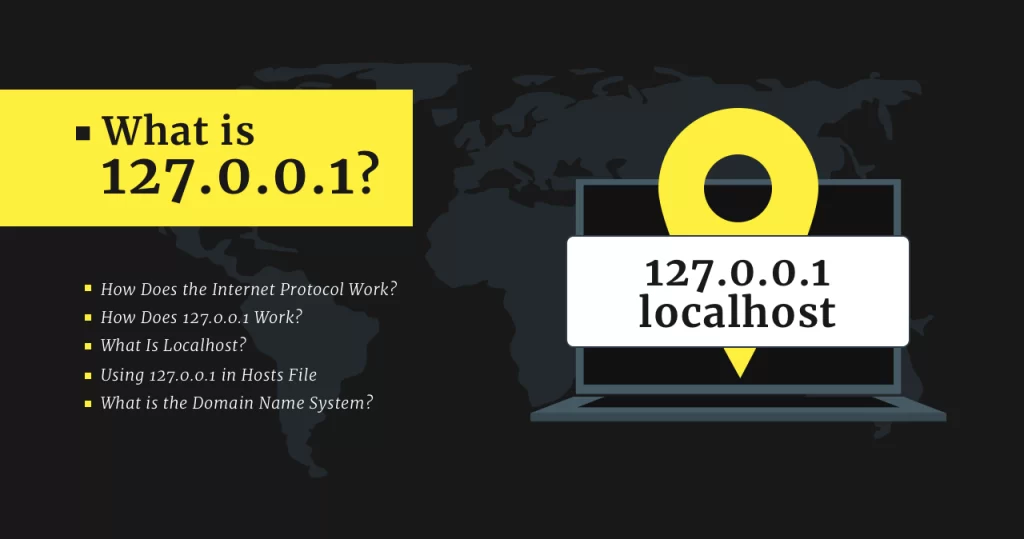Explanation of the IP address 127.0.0.1 and the term localhost in computer networks
Computer experts around the world already know what 127.0.0.1 means, but many may not know why this address exists and why it is associated with localhost . Although we will hardly ask ourselves this question in everyday life (especially if we only use smartphones or tablets), it is worth investigating some more technical aspects of IT, so as to be prepared in case someone asks us if they know localhost or what does the IP address 127.0.0.1 mean .
In the following in-depth analysis we will see together what 127.0.0.1 is, what it really is for and what origin it had in the IT field , so that we can enrich ourselves with technical information and be able to easily overcome any very difficult question on the subject, especially if asked to a person prepared or a nerd by definition.
What is the IP address 127.0.0.1?
The 127.0.0.1 address is a special IP address that identifies our own computer within the network; it is also referred to as localhost . Using this address, our computer, within a traditional LAN network, can contact itself through a program, a network client or a browser.

What is the IP address 127.0.0.1 used for?
Through localhost (which corresponds to the IP 127.0.0.1) we can actually make “our computer talk to itself”. Obviously this explanation is not sufficient to understand the usefulness of having an I address which actually corresponds to the same machine we are using.
Specifically, we can talk about localhost when a network service (web server) is installed on our PC, which can also be reached from the same terminal, so that we can contact that specific service as if it were any remote network service. This means that localhost is very useful when we want to test websites without loading them online or access services that have configuration panels accessible via a web page.
Examples of localhost
When we install the Plex server on our PC it is configurable through a web interface , loaded in the default browser on the operating system. When this interface is open we are not actually visiting any website, since the server is installed on the same machine: in fact we are accessing a local server via localhost, using a unique and easily replicable address on any PC (since all PCs can use localhost).
Why is the term localhost used?
The address 127.0.0.1 is associated with the word localhost because this is how Windows defines it in the hosts file , a special file that we can find in the C: Windows System32 drivers etc folder .
The best users can also modify the hosts file and point a website or an IP address of a web page to 127.0.0.1: in this way, since the requested server cannot be present on our terminal, the page will not be loaded on browsers and it will not be possible to browse that page.
Does 127.0.0.1 always match our computer?
The address 127.0.0.1 always corresponds to our terminal and you can never identify another computer or device on the network, also seen how a LAN network works. By carefully analyzing the numbers of the IP address we can see that 127 is the last number of a network with a Subnet Mask of value 255.0.0.0 . Class 127 has a particular function: all the IPs starting with 127 have a “loopback” function that makes the sent packets go back to the sender, without ever leaving the sending device. Within the 127 subnet, therefore, the IP address 127.0.0.1 is the first that can be assigned (127.0.0.0 cannot be used) and, since the PC in use is the only one that can “bounce its own packages “, is also the only available address of this type.
Obviously all devices that connect to a network will have their own 127.0.0.1, which can be used exclusively for local web servers or to test some network features. To conclude, it is interesting to know that 127.0.0.1 is the internal address on devices that use TCP / IP version 4 (IPv4) , ie the most common. In recent years it has also spread to TCP / IP version 6 : on this type of networks the local address corresponds to the number 0: 0: 0: 0: 0: 0: 0: 1.
Conclusions
In the end we can say that 127.0.0.1 or localhost is a sort of “mirror” in which the PC reflects itself: if the PC “speaks” the mirror reflects its “speeches”, so as to be able to access certain functions related to the sites web or local web servers (without internet access). We often use this function without even realizing it : if an application or service opens a web page for managing settings without accessing the Internet, we are almost certainly using localhost to take advantage of the interface, unless we use web apps with offline functionality .
-=———-
As a developer, you may have come across the terms “127.0.0.1” and “localhost” when setting up a local server or working with networking protocols. You may also be familiar with “0.0.0.0” and wonder how it compares to the former two. In this article, we will explore the differences between these IP addresses and when to use each of them.
127.0.0.1 vs localhost
Both 127.0.0.1 and localhost are used to refer to the local machine or the computer you are currently working on. They are often used interchangeably, but they are not exactly the same thing.
- 127.0.0.1: This is a specific IP address assigned to the “loopback” network interface. It is also referred to as the “loopback address.” When you send a packet to 127.0.0.1, it is sent back to your own computer without being sent over the network. This allows you to test network functionality on your own machine without sending traffic to other devices on the network.
- localhost: This is a hostname that resolves to the loopback address, 127.0.0.1. It is usually defined in the “hosts” file on your computer or in the DNS server. When you use “localhost” instead of 127.0.0.1, the operating system resolves it to the loopback address automatically.
In practical terms, there is no real difference between using 127.0.0.1 or localhost. They both refer to the same thing – your local machine.
127 vs 0.0.0.0
The difference between 127 and 0.0.0.0 is more significant.
- 127: This is a range of IP addresses reserved for loopback addresses. It includes 127.0.0.1, as well as 127.0.0.2, 127.0.0.3, and so on. Each of these addresses is used to refer to a different interface on the same machine.
- 0.0.0.0: This is a non-routable meta-address used to designate a default route. When a program listens on 0.0.0.0, it is listening on all available network interfaces on the machine, including the loopback interface and any physical network interfaces.
In summary, 127 is a range of loopback addresses, while 0.0.0.0 is a special address used to indicate all available network interfaces.
Is 127.0.0.1 the same as 0.0.0.0?
No, they are not the same thing. While both addresses refer to the local machine, they are used in different ways. 127.0.0.1 is used to refer to a specific loopback address, while 0.0.0.0 is used to indicate all available network interfaces.
When you bind a server to 127.0.0.1, it will only be accessible on the loopback interface, while binding to 0.0.0.0 will make it accessible on all interfaces.
Conclusion
In conclusion, 127.0.0.1 and localhost are interchangeable and both refer to the loopback address on the local machine. 127 is a range of loopback addresses, while 0.0.0.0 is a special address used to indicate all available network interfaces. It is important to understand the differences between these IP addresses to use them effectively in your development work.
Q: What is the difference between 127.0.0.1 and localhost?
A: Both 127.0.0.1 and localhost are used to refer to the local machine, but 127.0.0.1 is a specific IP address assigned to the loopback network interface, while localhost is a hostname that resolves to 127.0.0.1.
Q: What is the difference between 127 and 0.0.0.0?
A: 127 is a range of loopback addresses, while 0.0.0.0 is a special address used to indicate all available network interfaces on the machine.
Q: Is 127.0.0.1 the same as 0.0.0.0?
A: No, they are not the same thing. 127.0.0.1 is a loopback address, while 0.0.0.0 is used to indicate all available network interfaces on the machine.
Q: When should I use 127.0.0.1 or localhost?
A: You can use either one interchangeably when referring to the local machine. However, if you need to specify a specific loopback address, use 127.0.0.1.
Q: When should I use 0.0.0.0?
A: You should use 0.0.0.0 when you want to listen on all available network interfaces on the machine.
Q: Can I bind a server to both 127.0.0.1 and 0.0.0.0?
A: Yes, you can. When you bind a server to both 127.0.0.1 and 0.0.0.0, it will listen on the loopback interface and all available network interfaces on the machine.
Q: Are there any security implications when using 127.0.0.1 or localhost?
A: No, there are no security implications when using these addresses as they only refer to the local machine. However, when binding a server to all available network interfaces using 0.0.0.0, make sure to secure it properly to prevent unauthorized access.
Q: Can I use other loopback addresses besides 127.0.0.1?
A: Yes, the loopback range includes other addresses besides 127.0.0.1, such as 127.0.0.2 and 127.0.0.3. However, 127.0.0.1 is the most commonly used loopback address.




